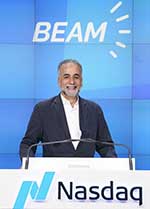Charged Up Over Batteries
Said Al-Hallaj brings a quarter-century of experience developing technology to store power generated from renewable resources into the MSES classroom.
Said Al-Hallaj’s journey to becoming an innovator in renewable energy storage starts in his sun-soaked homeland of Jordan.
For a country that receives more than 300 days of full sun every year and is in a region known for providing oil to much of the world, Al-Hallaj’s native country is neither a solar-power nor a petroleum producing juggernaut. In fact, the Middle Eastern nation imports more than 90 percent of its energy.
 From Al-Hallaj’s perspective, it shouldn’t have to.
From Al-Hallaj’s perspective, it shouldn’t have to.
That was the initial motivation that led Al-Hallaj to his current positions as the chief battery scientist at Beam Global and an instructor in Northwestern's Master of Science in Energy and Sustainability (MSES) program.
“I always felt that renewable energy is something that could not just solve a technical problem, but that really could make the world a better place,” said Al-Hallaj, who came to the United States in the mid-1990s to work on his PhD in chemical engineering. “I would love for people to come and visit Jordan to enjoy the Dead Sea or the historic sites, not for war or oil.”
MSES is jointly offered by Northwestern Engineering and the Paula M. Trienens Institute for Sustainability and Energy. Al-Hallaj has taught the program’s Advanced Topics in Electric Technologies: Storage and Microgrids course for five years.
His classroom mission is to give students enough knowledge to be professionally skeptical when they are confronted with a sales pitch about battery storage and electric grids that rely on renewable energy.
“The whole goal of the class is not to have them be experts in everything, but to be dangerous, to be able to sit in a room and listen to a pitch on an idea about a new battery and ask good questions,” Al-Hallaj said. “That tends to flush out the fluff.”
Al-Hallaj has built his career on the scientific realities of what existing batteries can do while pushing for research and development into new technologies that expand their capabilities. That led him to found his battery storage company, AllCell Technologies, in 2001.
One of his customers was Beam Global, a renewable energy equipment manufacturer. In 2022, Beam Global looked to improve its vertical integration and approached Al-Hallaj with an offer to buy AllCell. The timing and logistics worked out, and today Al-Hallaj lives his dream life working in the lab innovating battery technology before heading to the classroom to teach students from the deep well of knowledge accumulated over his 25-year career.
“I love the R&D environment, I love the university, and I love teaching,” he said. “I get to work in the lab, work with students, and then take it all from the lab to the marketplace.”
One of Al-Hallaj's latest projects with Beam Global is BeamWellTM, a self-sufficient, self-contained operational system that delivers fresh water, electricity, and e-mobility to areas that lack infrastructure but need life-sustaining water and electricity. The system is transportable and can be deployed in minutes.
Al-Hallaj calls the system one of his greatest accomplishments.
To drive home the importance of thinking about the application of new storage technologies, Al-Hallaj challenges his students to solve a program involving renewable energy storage using a microgrid — a self-contained power-generating system that exists outside the larger grid traditionally run by an electric company.
Solutions have ranged from a self-sufficient solar array and storage in Aspen to ensure power during its incredibly short money-making ski season all the way across the globe to a rural electrification effort with solar farms in some of the most remote areas of India and Tibet.
Al-Hallaj said he constantly comes away impressed with the caliber of students in the MSES program — and with the program itself.
“This program makes me jealous. I want to join the program as a student one of these days,” he said. “And oh my gosh, these students are fun. We’re getting really good at finding quality students.”